Mono Cases: Can a Gig Bag Really Keep Your Guitar Safe?
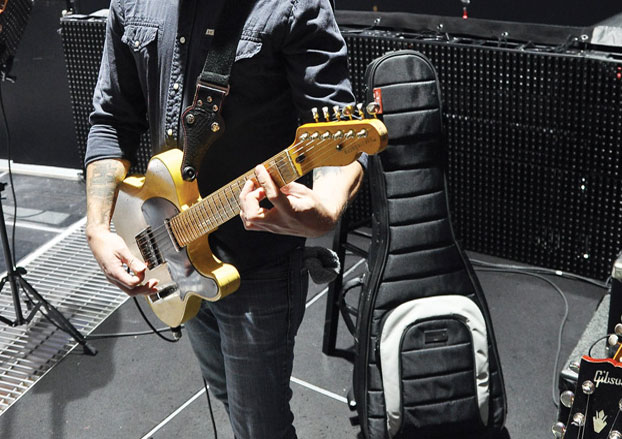
If you’ve ever experienced the horror of opening a case to find a wounded instrument inside, you know how important it is to trust in whatever protective place you store your guitar.
A great case gives you confidence and peace of mind, secure in the knowledge that your prized possession is safe.
Guitar repair guru Gary Brawer knows all too well what can happen to guitars in substandard cases. As one of the top techs in the world—with clients that include Metallica, Joe Satriani and Neal Schon—Brawer has had to undo the damage that inadequate protection can cause to an instrument, and he has very definite ideas on how you can avoid those pitfalls.
Headstock“There are several areas on the guitar that are susceptible to damage if it’s in a gig bag that falls over or is dropped,” he says.
“Let’s start with the headstock. Because the area behind the nut is usually thin and not reinforced, it is the most vulnerable part of the guitar for breakage. String tension is pulling at the headstock with a lot of force, and if it gets hit in the wrong way, that can cause anything from a slight crack to snapping the peghead right off. I’ve seen this constantly over the years—it doesn’t necessarily take much to do it. If you don’t have good protection over the peghead and your case tips over, the strings will pull it in that direction and break it.”
Broken Headstock from Gary’s Repair Shop
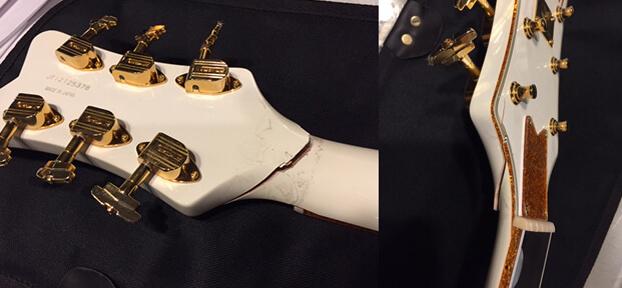
Fretboard
The headstock isn’t the only part of the neck that is at risk in a flimsy bag. “I’ve also seen this,” Brawer says. “A guitar in a cheap gig bag falls over on its face. That shock separates the fingerboard from the rest of the neck, usually from the nut to the fifth-fret area. If the glue joint is weak in any way, a forceful hit can simply pull the fretboard off.”
Get The Pick Newsletter
All the latest guitar news, interviews, lessons, reviews, deals and more, direct to your inbox!
Obviously, anything that can provide support and a “safe space” around such a sensitive area on the guitar would go a long way toward preventing these mishaps, and the Headlock headstock suspension system in Mono cases does exactly that. Stabilizing the neck during transport, it provides top-notch protection.
MONO Automated Headlock System
“I give the Headlock a lot of credit,” Brawer says. “Anything that holds the neck stable in the case is a great idea. It took me a while to figure that out, but when I really looked at the construction, and how it immobilizes and supports the neck, I totally got it. There’s less movement within the shell of the case, and that provides an extra barrier, an extra cushion.”
Tuners
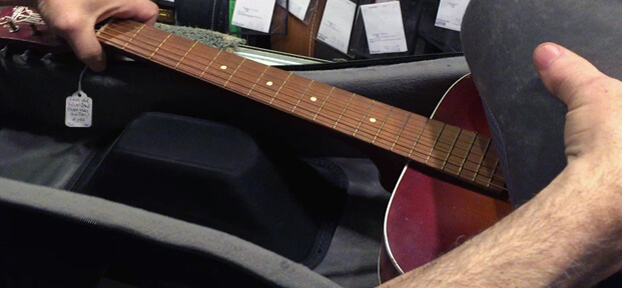
“We just had a customer who somehow hit the side of his gig bag and sheared off the button of a tuner. We had to replace the whole tuner. I’ve seen tuners hit so hard that they actually twisted and either ripped the mounting screw out of the wood or actually cracked the peghead through the screw holes or tuner holes. Not all tuning machines are held on real well, so you really don’t want anything to impact them. Once again, Mono cases do a great job of guarding against that.”
Pots and Switches
It might seem like the electronics of a guitar or bass would be less susceptible to damage in a cheap or flimsy case, and in some ways that’s true. It would take a lot to knock a pickup out of commission. But that doesn’t mean there’s no danger.
“The thing we see the most is switches being broken off,” Brawer says. “That’s really common with a poorly constructed bag. Something will hit the top of the bag and the pickup selector or coil-cut switch can get broken. A little less common would be breaking a knob or shearing a potentiometer off, but if you had a push/pull knob that was stuck in the out position, it could definitely happen.”
Strap Buttons
Because of where they’re positioned—basically right where the guitar will land if it slips off your shoulder—strap buttons present unique challenges when it comes to safeguarding them. Mono cases do not mess around, and provide more protection than any case on the market. The Boot on the bottom of the Vertigo case in particular will keep your guitar safe even in the event of extreme vertical drops.
Mono Vertigo Protective Boot
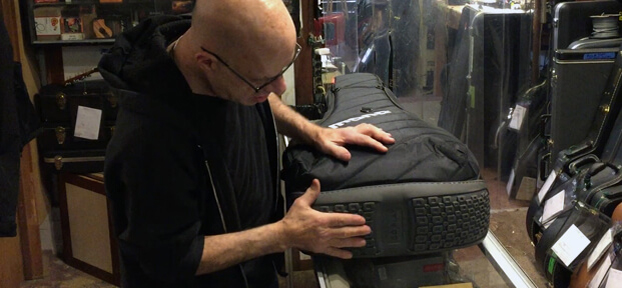
“Like I have, they must have seen so many problems that they knew needed to beef up that part of the case. That Boot is like a truck tire on the bottom of the case. It’s shaped in a way that the strap button won’t take the hit if the case is dropped. On electric guitars I’ve seen strap buttons get pushed into the body after a drop. Then I would have to drill it out to repair it. On acoustics it’s even worse. The strap button or end-pin jack can get shoved right into the end block of the guitar, potentially splitting it. It’s a fairly elaborate repair. There are ways to fix it, but a well-constructed bag can prevent these problems from happening in the first place.”
Brawer is well aware of the dangers that acoustic guitars face on a daily basis. His recommendation? Put your prized acoustic in a Mono case.
“An acoustic guitar is just a thinly constructed hollow box that is much more prone to damage than a solid piece of wood. The more you can protect the bottom and the front of the instrument the better. When you zip up a bag, you want to feel that there’s some kind of a shell around your acoustic. A lot of bags don’t have any structure to them, but the Mono cases really do, and that gives you confidence.
“I started selling Mono cases because I noticed a lot of my customers were coming in with their guitars in them. And these were really nice guitars: PRS, Suhr, Tom Anderson—very expensive guitars that cost $3,000 or $4,000. These customers were trusting Mono cases to protect their instruments. That’s when the idea of a high-end case like MONO started to make sense to me. I carried a couple and they started selling immediately. I’ve been really pleased with the response and I’m really impressed with the product. I would put any guitar I own in a MONO case.”
For more on MONO cases, check out monocreators.com.
Guitar repair guru Gary Brawer
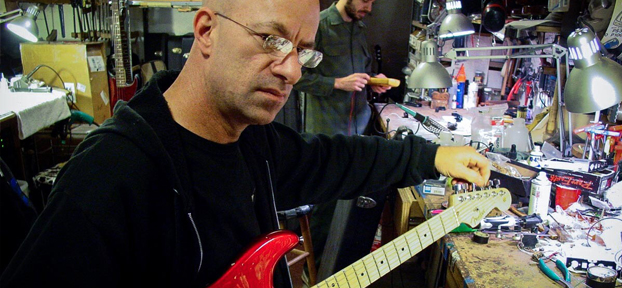
Since 1980, Guitar World has been the ultimate resource for guitarists. Whether you want to learn the techniques employed by your guitar heroes, read about their latest projects or simply need to know which guitar is the right one to buy, Guitar World is the place to look.
“Wins out on battery life, stealthy aesthetics and its well-judged Cable Tone feature”: Blackstar Airwire i58 review
“A distinctive brightness that no other strings have been able to capture”: How Rotosound revolutionized the bass world with its Swing Bass 66 strings – and shaped the sound of rock music in the process










